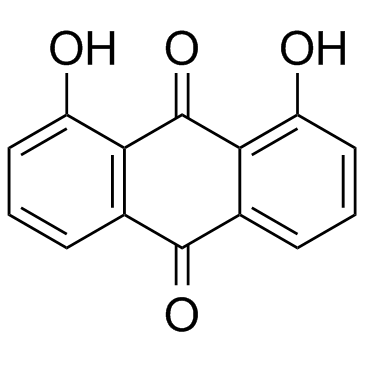Danthron (Dantron) |
| Catalog No.GC30056 |
Danthron (Dantron) is a natural product extracted from the traditional Chinese medicine rhubarb. Danthron (Dantron) functions in regulating glucose and lipid metabolism by activating AMPK.
Products are for research use only. Not for human use. We do not sell to patients.

Cas No.: 117-10-2
Sample solution is provided at 25 µL, 10mM.
Danthron is a natural product extracted from the traditional Chinese medicine rhubarb. Danthron functions in regulating glucose and lipid metabolism by activating AMPK.
Danthron (0.1, 1, and 10 μM) dose-dependently promotes the phosphorylation of AMPK and acetyl-CoA carboxylase (ACC) in both HepG2 and C2C12 cells. Meanwhile, Danthron treatment significantly reduces the lipid synthesis related sterol regulatory element-binding protein 1c (SREBP1c) and fatty acid synthetase (FAS) gene expressions, and the total cholesterol (TC) and triglyceride (TG) levels. In addition, Danthron treatment efficiently increases glucose consumption. Danthron effectively reduces intracellular lipid contents and enhances glucose consumption in vitro via activation of AMPK signaling pathway. 10 μM Danthron/24 h is safe for HepG2 cells. With 80% confluence, HepG2 cells are incubated with Danthron (0.1-10 μM) in FBS-Free media for 8 h. Subsequently, cells are harvested for Western blot assay. Danthron increases the p-AMPK protein in a dose-dependent manner, and no changes in t-AMPK protein are observed[1]. Danthron inhibits 9-cis retinoic acid (9cRA)-induced retinoic X receptor α (RXRα) transactivation by IC50 at 0.11 μM. To further clarify the stoichimetric ratio of Danthron binding to RXRα-ligand-binding domain (LBD), isothermal titration calorimetry (ITC) experiment is performed. The KD value of Danthron binds to RXRα-LBD by ITC experiment is determined at 7.5 μM[2].
Danthron functions as an insulin sensitizer in vivo. Danthron improves insulin sensitivity in diet-induced obese (DIO) mice. The insulin tolerance test result shows that Danthron (5 mg/kg) treated diet-induced obesity mice exhibit lower glucose levels after insulin challenge, compared with the control vehicle-treated group[2].
[1]. Zhou R, et al. Danthron activates AMP-activated protein kinase and regulates lipid and glucose metabolism in vitro. Acta Pharmacol Sin. 2013 Aug;34(8):1061-9. [2]. Zhang H, et al. Danthron functions as a retinoic X receptor antagonist by stabilizing tetramers of the receptor. J Biol Chem. 2011 Jan 21;286(3):1868-75.
Average Rating: 5 (Based on Reviews and 36 reference(s) in Google Scholar.)
GLPBIO products are for RESEARCH USE ONLY. Please make sure your review or question is research based.
Required fields are marked with *




















